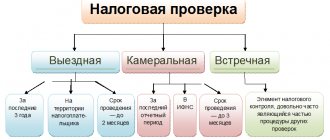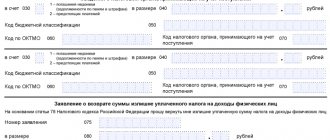Article 229 of the Tax Code of the Russian Federation. Tax return (current version)
Article 229 of the Tax Code of the Russian Federation deals with the tax return for personal income tax and the deadlines for its submission.
Federal Law of July 27, 2010 N 229-FZ “On amendments to part one and part two of the Tax Code of the Russian Federation and some other legislative acts of the Russian Federation, as well as on the recognition as invalid of certain legislative acts (provisions of legislative acts) of the Russian Federation in connection with with the settlement of debts for the payment of taxes, fees, penalties and fines and some other issues of tax administration" (hereinafter referred to as Law No. 229-FZ) in paragraph 1 of paragraph 3 of Article 229 of the Tax Code of the Russian Federation the words "and (or) termination of payments specified in Article 228 of this Code" and the words "or such payments" were deleted.
These changes, in accordance with Part 1 of Article 10 of Law N 229-FZ, came into force after one month from the date of its official publication. Law No. 229-FZ was published in Rossiyskaya Gazeta on August 2, 2010.
Previously, until September 2, 2010, early submission of personal income tax returns was provided.
Personal income tax returns were filed early in two cases, namely: upon termination of activities by an individual entrepreneur or a person engaged in private practice and upon termination of receipt of payments specified in Article 228 of the Tax Code of the Russian Federation.
However, in connection with the entry into force of changes to paragraph 3 of Article 229 of the Tax Code of the Russian Federation, upon termination of payments specified in Article 228 of the Tax Code of the Russian Federation, the taxpayer has the right to submit a tax return on the income actually received according to the general rules, that is, no later than April 30 of the following year.
Important!
Please note that personal income tax payers can fill out and submit a tax return in Form 3-NDFL in the interactive service “Taxpayer Personal Account for Individuals” on the official website of the Federal Tax Service of Russia.
Official position.
The letter of the Ministry of Finance of Russia dated 02/04/2014 N 03-02-08/4326 draws attention to the fact that the norms of the Tax Code of the Russian Federation sufficiently regulate issues related to the declaration of income received by individuals and penalties for failure to submit a tax return. Individuals who received income from which personal income tax was not withheld by tax agents are required to independently calculate and pay this tax. These taxpayers are required to submit a corresponding tax return to the tax authority at their place of registration no later than April 30 of the year following the expired tax period.
Analyzing Article 229 of the Tax Code of the Russian Federation, the Ministry of Finance of Russia explained that the taxpayer has the right not to file a tax return on income from the sale of an apartment that belonged to the taxpayer for more than three years, if there is no other income subject to declaration (see letter of the Ministry of Finance of Russia dated April 15, 2011 N 03-04 -05/5-264).
In a letter dated 04/07/2011 N 03-04-05/6-235, the regulatory authority explained that an individual who is not recognized as a tax resident of the Russian Federation, who received income from the sale of real estate on the territory of the Russian Federation, is obliged to submit a tax return and pay tax on income of individuals in relation to the specified income.
In a letter dated 04/05/2011 N 03-04-05/6-221, the official body noted that individuals are tax residents of the Russian Federation receiving income from sources located outside the Russian Federation, calculation, declaration and payment of personal income tax produced independently at the end of the tax period.
As the financial department indicated, the calculation, declaration and payment of personal income tax on income in the form of material benefits are carried out independently by clients of a credit organization who are not its employees in the manner prescribed by Articles 228 and 229 of the Tax Code of the Russian Federation, regardless of the amount of income received in the form of material benefit (see letter dated March 18, 2011 N 03-04-06/6-44).
In a letter dated 02/01/2011 N 03-04-05/6-46, the Russian Ministry of Finance explained that the Tax Code of the Russian Federation does not contain a requirement to submit documents confirming the amount of income received when filing a tax return. Such documents may be required during a tax audit conducted by the tax authority.
In a letter dated January 13, 2011 N 20-14/4/001321, the tax department explained that individuals who received income during the tax period from the sale of property owned by them, except for the cases provided for in paragraph 17.1 of Article 217 of the Tax Code of the Russian Federation, when income is not taxed, are required to independently calculate and pay the personal income tax due (additional payment) at the end of the tax period, and also submit a personal income tax declaration to the tax authority at the place of residence no later than April 30 of the year following expired tax period.
The letter of the Ministry of Finance of Russia dated 04/08/2014 N 03-04-РЗ/15818 addressed the issue of personal income tax taxation of income from the sale of a land plot owned for more than three years. In relation to the issue under consideration, the tax authority indicated that, on the basis of Article 229 of the Tax Code of the Russian Federation, the taxpayer has the right not to file a tax return on income from the sale of a land plot that has been owned for more than three years, if there is no other income that must be declared.
The letter of the Ministry of Finance of Russia dated August 26, 2013 N 03-04-05/34878 also states that the taxpayer has the right not to file a tax return on income from the sale of a car that was owned by the taxpayer for more than three years, if there is no other income that must be declared.
As the tax authority noted, paragraph 4 of Article 229 of the Tax Code of the Russian Federation establishes that in tax returns individuals indicate all income received by them in the tax period, unless otherwise provided by this paragraph, sources of their payment, tax deductions, tax amounts withheld by tax agents, amounts advance payments actually paid during the tax period, tax amounts subject to payment (additional payment) or refund based on the results of the tax period.
Thus, the right to use this property tax deduction arises only for those individuals who receive income taxed at a rate of 13 percent, since the provision of the specified tax deduction provides for the refund of the tax paid by the taxpayer during the tax period (see letter dated December 31, 2010 N 20-14/4/ [email protected] ).
In a letter dated December 31, 2010 N 20-14/4/ [email protected] the Federal Tax Service of the Russian Federation for the city of Moscow explained that in connection with receiving income from the sale of an apartment owned for less than three years, its owner has an obligation in the prescribed manner upon submission to the tax authority at the place of residence of a tax declaration on personal income tax and payment of tax in the amount calculated in accordance with such declaration.
The letter of the Ministry of Finance of Russia dated 08/05/2013 N 03-04-06/31388 explains that when an organization pays to a taxpayer income received as a result of transactions for the purchase and sale of foreign currency on the foreign exchange market, such an organization is not recognized as a tax agent. In this case, the calculation and payment of tax are carried out by the taxpayer independently on the basis of a tax return submitted to the tax authority at the end of the tax period. At the same time, if transactions with foreign currency, in accordance with existing regulatory legal acts, can be classified as operations with financial instruments of forward transactions, the appropriate rules for determining the tax base when carrying out transactions with financial instruments of forward transactions, provided for in Article 214.1 of the Tax Code of the Russian Federation, should be applied to them. , and in this case the organization will be recognized as a tax agent.
Important!
Please note that the obligation to submit to the tax authority, along with the tax return, documents (copies thereof) confirming the income received by the taxpayer is not provided for by the provisions of the Tax Code of the Russian Federation.
Current problem.
In practice, a situation arises when taxpayers try to shift their responsibility for filing a personal income tax return to other persons, for example, a bankruptcy trustee, which subsequently leads to legal disputes involving tax authorities.
In this regard, please note that the obligation to file a tax return is a personal responsibility of the personal income tax payer, which cannot be assigned to the bankruptcy trustee, as a result of which the complaint in this part cannot be satisfied. Arbitration courts adhere to this position.
Arbitrage practice.
Thus, the Resolution of the Third Arbitration Court of Appeal dated 02/03/2014 N A33-17848/2010k36 explains that the bankruptcy trustee cannot reliably know about all the information to be reflected in the tax return in accordance with Part 4 of Article 229 of the Tax Code of the Russian Federation, while the debtor , on the contrary, has all the information necessary to provide reliable information in the tax return. In the context of a bankruptcy case of an individual entrepreneur, the debtor is a person participating in the case and has the right to take part in meetings of creditors, receive other information from the bankruptcy trustee, including necessary for preparing and filing a tax return.
In this regard, the court came to the conclusion that the obligation to file a tax return is a personal responsibility of the taxpayer, which cannot be assigned to the bankruptcy trustee. On this basis, the court refused to satisfy the appeal of the individual entrepreneur and left the decision of the first instance unchanged.
Current problem.
Please note that in practice, a situation often arises when personal income tax taxpayers indicate different taxpayer category codes in their tax returns, which causes certain difficulties and gives rise to misunderstandings on the part of the tax authorities.
In relation to this situation, it should be noted that the indication of different taxpayer category codes in the submitted tax returns does not indicate the filing of two different personal income tax returns, which corresponds to the established judicial practice of arbitration courts.
Arbitrage practice.
The Resolution of the Seventeenth Arbitration Court of Appeal dated April 17, 2014 N 17AP-3167/2014-AK explains that the indication in the submitted tax returns of various codes of taxpayer category 760 (individual, with the exception of an individual entrepreneur, notary and other person engaged in private practice, lawyer , who established a lawyer’s office, and the head of a peasant (farm) enterprise) and 720 (individual entrepreneur) does not indicate the filing of two different declarations, since the provisions of Article 229 of the Tax Code of the Russian Federation provide for the filing of one declaration in form 3-NDFL for all categories of taxpayers with filling out different sheets the said declaration.
Comment source:
“ARTICLE-LINE COMMENTARY TO CHAPTER 23 OF THE TAX CODE OF THE RUSSIAN FEDERATION “INDIVIDUALS INCOME TAX” (UPDATED)
Yu.M. Lermontov, 2014
Can a taxpayer refuse to participate in the review of documents?
One of the pressing issues in the area of interaction between taxpayers and the Federal Tax Service under consideration is whether the former can refuse to participate in the study of documents as part of tax audits. In accordance with paragraph 2 of Art. 101 of the Tax Code of the Russian Federation, the absence of representatives of the inspected organization when considering the inspection materials cannot be an obstacle to carrying out the relevant event, but only if the head of the Federal Tax Service does not consider that their participation is mandatory. Thus, the representative has the right not to interact with the Federal Tax Service during the study of documents, but department officials may consider that this procedure cannot be carried out without his participation.
At the same time, the Federal Tax Service has at its disposal a very effective countermeasure in case the payer’s participation in the review of documents is highly desirable, but he avoids interacting with the tax authorities. The Ministry of Finance, in paragraph 4 of letter No. AS-4-2/9355 dated May 23, 2013, recommends that territorial tax authorities provide taxpayers with notifications of the date, time, and place of consideration of inspection documents simultaneously with the acts that correspond to these inspections. If the payer does not accept this notification, the inspector may, in accordance with the recommendation of the Federal Tax Service, draw up a protocol on the administrative violation provided for in Art. 19.1.4 Code of Administrative Offenses of the Russian Federation. That is, the taxpayer in this case may be held liable for obstructing the activities of the tax authority. As a result, the company's official and the organization itself may be fined.


